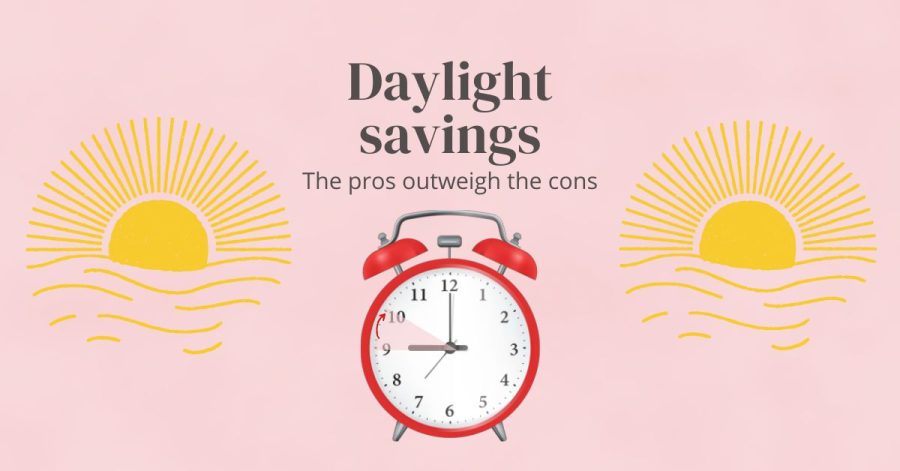Daylight Saving Time should be permanent

More stories from Gaby Sciaudone
In March, we set our clocks an hour forward, and in November, we set our clocks back an hour. However, the pros of daylight saving time far outweigh the cons, which is why we should switch to having daylight savings all year long.
As the first Sunday of November takes place, billions of people around the world set their clocks back an hour, gaining an hour of sleep in the process. And while an extra hour of sleep is nice, do the benefits of changing your clocks outweigh the negatives?
Daylight Saving Time, also known as DST, is the practice of turning clocks forward one hour in preparation for the summer season and setting it back an hour to Standard Time for the winter season, in an effort to maintain as much daylight as possible. DST was first used in 1918, and the concept was first proposed by Franklin Roosevelt during World War II.
Recently, as people have become more aware of seasonal depression and other mental health issues, it has become a topic of debate over whether or not we should switch to daylight saving time all year long. I’m here to tell you why we should.
Numerous teenagers endure some sort of holiday funk – often called the “winter blues ” – during the winter season as the days get shorter and school workload increases. Students struggle to find joy in what should be a happy and fun holiday season. As a student who has dealt with such feelings, I often find myself wondering why that is.
Sunshine gives off the chemical serotonin while darkness gives off the chemical melatonin. Higher melatonin levels cause people to feel tired, while higher serotonin levels cause people to feel happy and energetic. As the sun begins setting earlier in the day, the increase in melatonin and decrease in serotonin can cause seasonal depression.
Seasonal Affective Disorder – SAD for short – is a form of depression in which a person is depressed for one time of the year, due to the lack of sunlight. SAD causes mood changes, negative thinking, low energy, an inability to focus, worsened eating habits and several other symptoms.
While SAD is something to be aware of, the shift from DST to Standard Time has many other negative effects. For example, when we shift our clocks an hour forward, we become hungry an hour earlier than we normally would, which can lead to hunger pangs, irritability, and overeating.
Another aspect of health disrupted by the time change is our circadian rhythm, which is essentially the body’s internal clock. A disruption of this rhythm can lead to hormonal imbalance, which can develop into insomnia, depression, and poor immunity. Because of this, it can often take a while for people to adjust to the new time.
Year after year, I never get used to standard time and the effects that come with it. So what would happen if Daylight Saving Time became the new standard?
For starters, evening car accidents would occur significantly less. Traffic is greatly affected as the sun goes down; in the evening, more people are likely to be on the road, and a higher percentage of people have alcohol in their systems.
Additionally, there would be no more 5 p.m. sunsets, no more short winter days, and you could finally enjoy afternoon sunshine all year long.
So, even though you do get an extra hour of sleep on a November night each year, the consequences of going back to Standard Time far outweigh the benefits. Life would be easier, safer and better if we all moved our clocks forward one last time, and kept it that way forever.




